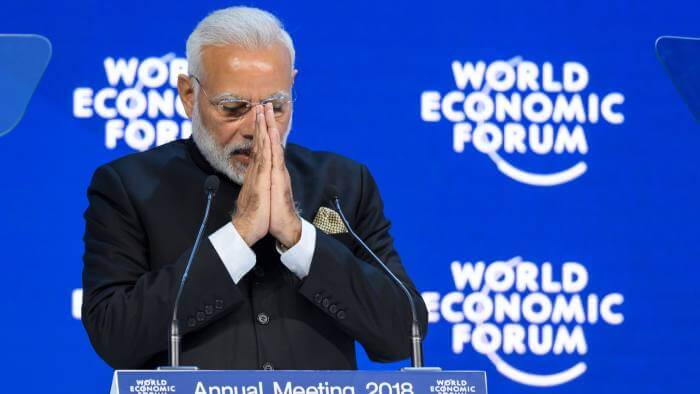Speaking at the World Economic Forum’s Davos Dialogue, Indian Prime Minister Narendra Modi focused largely on the containment of the coronavirus pandemic, the country’s commitment to self-reliance under the Aatmanirbhar Bharat vision, inviting foreign investment, and driving sustainable and eco-friendly economic development.
PM Modi began his speech by hailing the “message of confidence, positivity, and hope” instilled by India’s 1.3 billion people, who form 18% of the world’s population, during the ongoing pandemic. He lauded the country for disproving the predictions of several health experts, who opined last year that India would likely reach 800-900 million infections and two million deaths. Modi said that this could not have been possible without “proactive public participation” and that this was supported by reinforcing public health infrastructure, training health professionals, and implementing a comprehensive and technologically-backed testing and tracking regime. These factors have contributed greatly in India achieving a 97% recovery rate from the virus, which India’s leader said has staved off a “great tragedy”.
The PM then infused his commentary on the pandemic with his Aatmanirbhar Bharat, or self-reliant India, scheme, saying that India has used this pandemic to bolster its domestic production of PPE and masks, for which it earlier relied on foreign suppliers. India has also developed two of its own vaccine candidates and launched the world’s largest vaccination program, which Modi said would inoculate 30 million frontline workers in Phase 1 before moving on to India’s 300 million elderly citizens and those with comorbidities.
India has also been helping other countries during these unprecedented times and has sent medicines to over 150 nations, and even delivered free vaccines to Nepal, Bhutan, and Bangladesh. Simultaneously, Indian medical professionals have led training efforts for their counterparts across the world, while naturopathic practitioners have illustrated the benefits Ayurveda holds in building a strong immune system.
Also Read: China’s Xi Jinping Calls on States to “Abandon Ideological Prejudice” in Davos Speech
Next, Modi celebrated the potential rewards of the Fourth Industrial Revolution, which will be driven by globalism, connectivity, automation, artificial intelligence or machine learning, and real-time data. India, Modi said, has already made massive strides forward in this regard by digitising several of its identification measures and government infrastructure. One example of this is the Aadhar government ID, which is connected to citizens’ bank accounts and phone numbers. He said that the next step would be instituting similar reforms in the health industry by generating a Unique Health ID for each citizen.
Lastly, he remarked that India remains firmly committed to the “global good” and has both the capacity and capability to strengthen the “global supply chain”, and that the world must seek to leverage India’s monumental consumer base. Modi remarked that his government has undertaken several structural reforms and placed an emphasis on production and incentive-based stimulus, alongside increasing the ease of doing business and investing in the country. All of this, Modi said, is being achieved with one eye on climate change.
PM Modi then fielded questions from various industry leaders from Siemens, Mastercard, IBM, and NEC Corporation.

